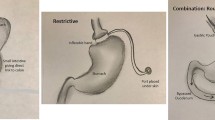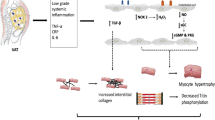Abstract
Purpose of review
This review will define morbid obesity and relationship between morbid obesity and heart failure syndromes. It will delve into unique challenges facing patients with dual diagnoses of heart failure and morbid obesity and examine the data that obesity should be a target in the treatment of heart failure.
Recent findings
Emerging literature has indicated the safety and efficacy of surgical weight loss in patients with heart failure. Furthermore, bariatric surgery with associated weight loss has been associated with improvements in heart failure symptoms and reverse remodeling on echocardiography. In patients with advanced heart failure, bariatric surgery has led to improvement in heart failure to obviate the need for cardiac transplantation or sufficient weight loss for cardiac transplant eligibility.
Summary
In heart failure patients who are morbidly obese, treatment of obesity is an effective therapeutic target with a myriad of potential benefits.
Similar content being viewed by others
References and recommended Reading
Papers of particular interest, published recently, have been highlighted as: • Of importance
Ogden CL, Flegal KM. Prevalence of obesity among adults and youth: United States, 2011–2014. 2015;8.
Defining adult overweight and obesity | overweight & obesity | CDC. 2019. Available at: https://www.cdc.gov/obesity/adult/defining.html. Accessed 2nd July 2019.
Ahmad FS, Ning H, Rich JD, Yancy CW, Lloyd-Jones DM, Wilkins JT. Hypertension, obesity, diabetes, and heart failure-free survival: the cardiovascular disease lifetime risk pooling project. JACC Heart Fail. 2016;4:911–9.
Kenchaiah S, et al. Obesity and the risk of heart failure. (2009). https://doi.org/10.1056/NEJMoa020245
Hägg S, et al. Adiposity as a cause of cardiovascular disease: a Mendelian randomization study. Int J Epidemiol. 2015;44:578–86.
Grundy SM, Brewer HB, Cleeman JI, Smith SC, Lenfant C. Definition of metabolic syndrome. Circulation. 2004;109:433–8.
Johnson AP, et al. Body mass index, outcomes, and mortality following cardiac surgery in Ontario, Canada. J Am Heart Assoc. 2015;4.
Nagendran J, et al. The varying effects of obesity and morbid obesity on outcomes following cardiac transplantation. Int J Obes. 2016;2005(40):721–4.
Lietz K, John R, Burke EA, Ankersmit JH, McCue JD, Naka Y, et al. Pretransplant cachexia and morbid obesity are predictors of increased mortality after heart transplantation. Transplantation. 2001;72:277–83.
Milano CA, Rogers JG, Tatooles AJ, Bhat G, Slaughter MS, Birks EJ, et al. HVAD: the ENDURANCE supplemental trial. JACC Heart Fail. 2018;6:792–802.
Mehra MR, Uriel N, Naka Y, Cleveland JC Jr, Yuzefpolskaya M, Salerno CT, et al. A fully magnetically levitated left ventricular assist device — final report. N Engl J Med. 2019;380:1618–27.
Slaughter MS, Rogers JG, Milano CA, Russell SD, Conte JV, Feldman D, et al. Advanced heart failure treated with continuous-flow left ventricular assist device. N Engl J Med. 2009;361:2241–51.
Caceres M, Czer LSC, Esmailian F, Ramzy D, Moriguchi J. Bariatric surgery in severe obesity and end-stage heart failure with mechanical circulatory support as a bridge to successful heart transplantation: a case report. Transplant Proc. 2013;45:798–9.
Lockard KL, Allen C, Lohmann D, Severyn DA, Schaub RD Jr, Kauffman KE, et al. Bariatric surgery for a patient with a HeartMate II ventricular assist device for destination therapy. Prog Transplant Aliso Viejo Calif. 2013;23:28–32.
Wang TJ, Larson MG, Levy D, Benjamin EJ, Leip EP, Wilson PWF, et al. Impact of obesity on plasma natriuretic peptide levels. Circulation. 2004;109:594–600.
Das SR, Drazner MH, Dries DL, Vega GL, Stanek HG, Abdullah SM, et al. Impact of body mass and body composition on circulating levels of natriuretic peptides. Circulation. 2005;112:2163–8.
Sugisawa T, et al. Association of plasma B-type natriuretic peptide levels with obesity in a general urban Japanese population: the Suita Study. Endocr J. advpub, 2010;1005060418–1005060418.
Beamish AJ, Olbers T, Kelly AS, Inge TH. Cardiovascular effects of bariatric surgery. Nat Rev Cardiol. 2016;13:730–43.
Vest AR, Heneghan HM, Schauer PR, Young JB. Surgical management of obesity and the relationship to cardiovascular disease. Circulation. 2013;127:945–59.
Appel LJ, Clark JM, Yeh HC, Wang NY, Coughlin JW, Daumit G, et al. Comparative effectiveness of weight-loss interventions in clinical practice. N Engl J Med. 2011;365:1959–68.
Pham D, De Albuquerque Rocha N, McGuire DK, Neeland IJ. Impact of empagliflozin in patients with diabetes and heart failure. Trends Cardiovasc Med. 2017;27:144–51.
Andersen T, Stokholm KH, Backer OG, Quaade F. Long-term (5-year) results after either horizontal gastroplasty or very-low-calorie diet for morbid obesity. Int J Obes. 1988;12:277–84.
Obesity-related cardiovascular risk factors after weight loss: a clinical trial comparing gastric bypass surgery and intensive lifestyle intervention. Eur J Endocrinol. 2010;163(5). Available at: https://eje.bioscientifica.com/view/journals/eje/163/5/735.xml. Accessed 28th June 2019.
Berger S, et al. Bariatric surgery among patients with heart failure: a systematic review and meta-analysis. Open Heart. 2018;5. Systematic review of recent populations suggesting bariatric surgery is associated with improvements in quality of life, re-duced hospital admissions, and improvements in heart failure symptoms in patients with obese patients with HF.
Shimada YJ, Tsugawa Y, Brown DFM, Hasegawa K. Bariatric surgery and emergency department visits and hospitalizations for heart failure exacerbation: population-based, self-controlled series. J Am Coll Cardiol. 2016;67:895–903 Bariatric surgery in HF patients is associated with reduction in emergency department visits and heart failure hospitalizations.
Vest Amanda R, et al. Clinical and echocardiographic outcomes after bariatric surgery in obese patients with left ventricular systolic dysfunction. Circ Heart Fail. 2016;9:e002260 Patients with left ventricular ejection fraction < 50% undergoing bariatric surgery compared with matched cohort of patients without surgery demonstrating greater improvement in LV ejection fraction post-op. No excess mortality detected at 1 year compared with bariatric surgery patients without depressed ejection fraction.
Lim C-P, Fisher OM, Falkenback D, Boyd D, Hayward CS, Keogh A, et al. Bariatric surgery provides a ‘bridge to transplant’ for morbidly obese patients with advanced heart failure and may obviate the need for transplantation. Obes Surg. 2016;26:486–93.
Wikiel KJ, McCloskey CA, Ramanathan RC. Bariatric surgery: a safe and effective conduit to cardiac transplantation. Surg Obes Relat Dis Off J Am Soc Bariatr Surg. 2014;10:479–84.
Miranda WR, et al. Impact of bariatric surgery on quality of life, functional capacity, and symptoms in patients with heart failure. Obes Surg. 2013;23:1011–5.
Vest AR, Heneghan HM, Agarwal S, Schauer PR, Young JB. Bariatric surgery and cardiovascular outcomes: a systematic review. Heart Br Card Soc. 2012;98:1763–77.
Ramani GV, McCloskey C, Ramanathan RC, Mathier MA. Safety and efficacy of bariatric surgery in morbidly obese patients with severe systolic heart failure. Clin Cardiol. 2008;31:516–20.
Alpert MA, Terry BE, Kelly DL. Effect of weight loss on cardiac chamber size, wall thickness and left ventricular function in morbid obesity. Am J Cardiol. 1985;55:783–6.
Department of General Surgery, University General Hospital Gregorio Marañón, Calle del Doctor Esquerdo, 46, 28007 Madrid, Spain et al. Improvement of ventricular ejection fraction after bariatric surgery in obese patients with dilated cardiomyopathy. Obes Res - Open J. 2015;1:1–3.
Samaras K, Connolly SM, Lord RV, Macdonald P, Hayward CS. Take heart: bariatric surgery in obese patients with severe heart failure. Two case reports. Heart Lung Circ. 2012;21:847–9.
Grapsa J, et al. The effect of bariatric surgery on echocardiographic indices: a review of the literature. Eur J Clin Investig. 2013;43:1224–30.
Iyengar S, Leier CV. Rescue bariatric surgery for obesity-induced cardiomyopathy. Am J Med. 2006;119:e5–6.
Mukerji R, Petruc M, Fresen JL, Terry BE, Govindarajan G, Alpert MA. Effect of weight loss after bariatric surgery on left ventricular mass and ventricular repolarization in normotensive morbidly obese patients. Am J Cardiol. 2012;110:415–9.
Leviner DB, Keidar A, Ben-Gal T, Medalion B. Cardiac function recovery following LVAD implantation and bariatric surgery in a morbidly obese patient. J Card Surg. 2014;29:740–2.
Reigle J. Heart failure, Obesity and Bariatric Surgery. Prog Cardiovasc Nurs. 2009;24:36–8.
Ristow B, Rabkin J, Haeusslein E. Improvement in dilated cardiomyopathy after bariatric surgery. J Card Fail. 2008;14:198–202.
Chaudhry UI, Kanji A, Sai-Sudhakar CB, Higgins RS, Needleman BJ. Laparoscopic sleeve gastrectomy in morbidly obese patients with end-stage heart failure and left ventricular assist device: medium-term results. Surg Obes Relat Dis Off J Am Soc Bariatr Surg. 2015;11:88–93.
Jeng EI, Aranda JM, Ahmed M, Klodell CT. Left ventricular assist device and bariatric surgery: a bridge to heart transplant by weight and waiting time reduction. J Card Surg. 2016;31:120–2.
Algahim MF, Sen S, Taegtmeyer H. Bariatric surgery to unload the stressed heart: a metabolic hypothesis. Am J Physiol Heart Circ Physiol. 2012;302:H1539–45.
Vest AR, Young JB. Should we target obesity in advanced heart failure? Curr Treat Options Cardiovasc Med. 2014;16:284.
Fenske W, Athanasiou T, Harling L, Drechsler C, Darzi A, Ashrafian H. Obesity-related cardiorenal disease: the benefits of bariatric surgery. Nat Rev Nephrol. 2013;9:539–51.
Leichman JG, Wilson EB, Scarborough T, Aguilar D, Miller CC III, Yu S, et al. Dramatic reversal of derangements in muscle metabolism and left ventricular function after bariatric surgery. Am J Med. 2008;121:966–73.
Johnson BL, et al. Bariatric surgery is associated with a reduction in major macrovascular and microvascular complications in moderately to severely obese patients with type 2 diabetes mellitus. J Am Coll Surg. 2013;216:545–56; discussion 556–558.
Schauer PR, Bhatt DL, Kirwan JP, Wolski K, Aminian A, Brethauer SA, et al. Bariatric surgery versus intensive medical therapy for diabetes — 5-year outcomes. N Engl J Med. 2017;376:641–51.
Author information
Authors and Affiliations
Corresponding author
Ethics declarations
Conflict of Interest
The author declares that there are no conflicts of interest.
Human and Animal Rights and Informed Consent
This article does not contain any studies with human or animal subjects performed by the author.
Additional information
Publisher’s Note
Springer Nature remains neutral with regard to jurisdictional claims in published maps and institutional affiliations.
This article is part of the Topical Collection on Heart Failure
Rights and permissions
About this article
Cite this article
Albert, C.L. Morbid Obesity as a Therapeutic Target for Heart Failure. Curr Treat Options Cardio Med 21, 52 (2019). https://doi.org/10.1007/s11936-019-0754-z
Published:
DOI: https://doi.org/10.1007/s11936-019-0754-z




